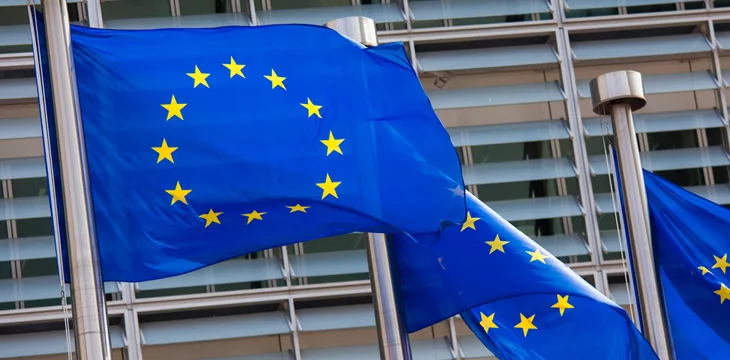|
Getting your Trinity Audio player ready...
|
The European Commission continues its campaign to reign in big U.S. tech as it opened
non-compliance investigations under the Digital Markets Act (DMA) into Alphabet (NASDAQ: GOOGL), Apple (NASDAQ: AAPL), and Meta (NASDAQ: META), all of whom it suspects are falling short of their obligations as “gatekeepers.”
“We are not convinced that the solutions by Alphabet, Apple and Meta respect their obligations for a fairer and more open digital space for European citizens and businesses,” said Thierry Breton, EU Commissioner for Internal Market.
“Should our investigation conclude that there is lack of full compliance with the DMA, gatekeepers could face heavy fines.”
The DMA came into force in May 2023 to ensure contestable and fair markets in the digital sector. It regulates so-called “gatekeepers,” which are large digital platforms that provide an important gateway between business users and consumers, “whose position can grant them the power to create a bottleneck in the digital economy.”
In September 2023, Alphabet, Amazon (NASDAQ: AMZN), Apple, ByteDance, Meta, and Microsoft (NASDAQ: MSFT) became the first six companies to receive the dubious honor of being labeled gatekeepers and were given until March 7, 2024, to comply with the associated obligations that come with the new title.
These obligations include allowing end users to easily uninstall pre-installed apps or change default settings on operating systems; virtual assistants or web browsers that steer them to the products and services of the gatekeeper; allowing end users to unsubscribe from core platform services of the gatekeeper as easily as they subscribe to them; and enabling business users to promote their offers and conclude contracts with their customers outside the gatekeeper’s platform.
Gatekeepers are also prohibited from certain activities and practices, including a ban on ranking their own products or services more favorably to those of third parties and a ban on requiring app developers to use certain of the gatekeeper’s services (such as payment systems or identity providers) in order to appear in the gatekeeper’s app stores.
After gathering feedback from stakeholders and assessing the six gatekeepers’ reports—which they were required to produce by March 7 and set out their compliance measures—the Commission was not satisfied that Alphabet, Apple, and Meta were complying with the DMA.
Specifically, the Commission was concerned about the choice screen for Safari and Meta’s “pay or consent model;” Alphabet’s rules on “steering” in Google Play and self-preferencing on Google Search; and Apple’s rules on steering in the App Store—Article 5(4) of the DMA requires gatekeepers to allow app developers to “steer” consumers to offers outside the gatekeepers’ app stores, free of charge.
“We suspect that the suggested solutions put forward by the three companies do not fully comply with the DMA,” said Margrethe Vestager, Executive Vice-President in charge of competition policy for the European Commission, on Monday. “We will now investigate the companies’ compliance with the DMA, to ensure open and contestable digital markets in Europe.”
In addition to the three principal investigations, the Commission said it was also taking “investigatory steps” relating to Apple’s new fee structure for alternative app stores and Amazon’s ranking practices on its marketplace.
The various investigations are to be concluded within 12 months. After this time, the Commission will inform the companies of its findings and explain the measures it is considering taking, or the company should take, to address the concerns.
To demonstrate how seriously the EU is taking the DMA obligations, the Commission also took the opportunity to reiterate the potential consequences of non-compliance.
In cases of infringement, it can impose fines of up to 10% of the company’s total worldwide turnover. Such fines can go up to 20% in cases of repeated infringement. In cases of systematic infringements, “additional remedies” can be adopted, such as forcing a gatekeeper to sell a business or parts of it and banning the gatekeeper from acquiring additional services related to the non-compliance.
Before such punishments are imposed, if the current compliance measures of Alphabet,
Apple, or Meta are found to be wanting, they will first be provided an opportunity to reform. Given the harsh nature of the fines and remedies, it’s likely the companies will eventually—reluctantly—fall in line rather than call the EU’s bluff.
EU committed to fair practices
In recent years, the EU has made a point of attempting to curb the influence of U.S. firms on local markets. Current competition law in the bloc focuses on preventing the abuse of dominant position, unfair competition practices, collusion and concerted practices, and predatory conduct.
Anti-competition practices are addressed by Article 102 of the Treaty on the Functioning of the European Union (TFEU), one of the European Union’s foundational treaties, which prohibits the abuse of a dominant position that may affect trade between member states, and in the EU Directive on Unfair Commercial Practices, which aims to “make it easier for businesses, especially small and medium-sized enterprises, to trade across borders.”
In 2023, the DMA built on these rules by focusing on the digital markets space and adding the gatekeeper classification with its associated new obligations.
“We know that some tech giants have used their market power to give their own products and services an unfair advantage and hold back competitors from doing business and creating added value and jobs,” said Breton, a champion of fair competition in the bloc and one of the driving forces behind the DMA.
When the Commission’s gatekeeper list was launched in September of last year, Breton stated that “it was high time that Europe sets its rules of the game upfront, providing a clear enforceable legal framework to foster innovation, competitiveness and the resilience of the Single Market, rather than having to rely on lengthy and not always effective antitrust investigations.”
This week’s announcement by the Commission serves to further demonstrate the bloc’s commitment to fostering fair practices in the tech space, and the companies under investigation will have to get their practices in line if they want to avoid hefty punishments in Europe.
Watch: Why blockchain regulatory oversight is important

 03-04-2026
03-04-2026 




